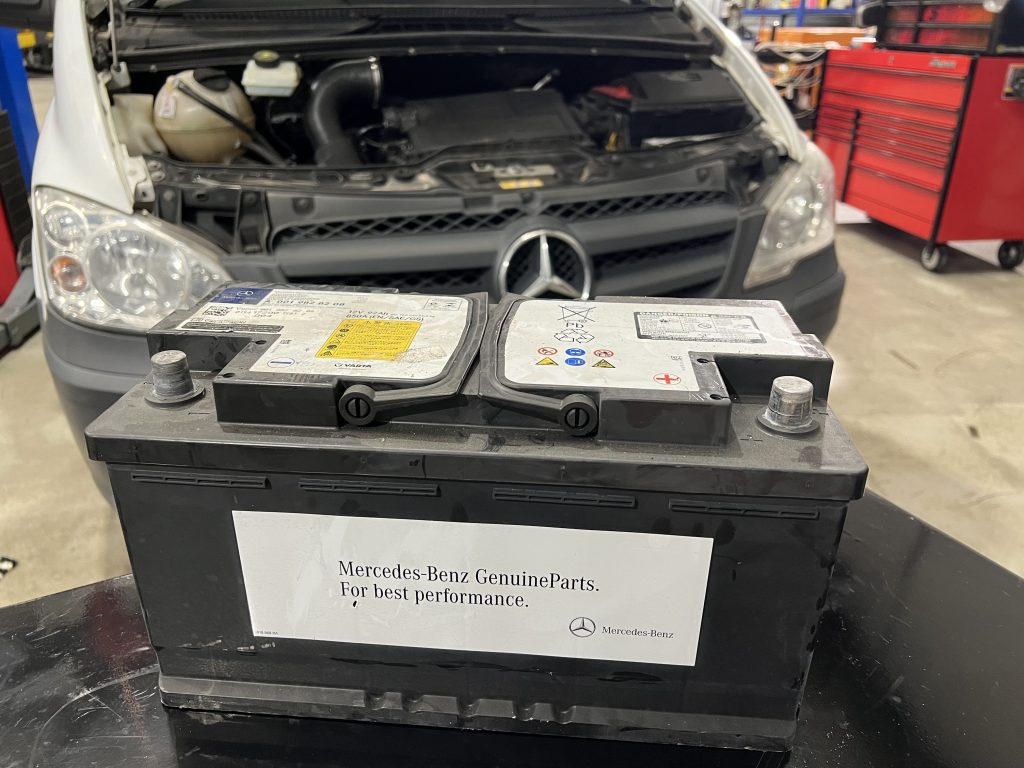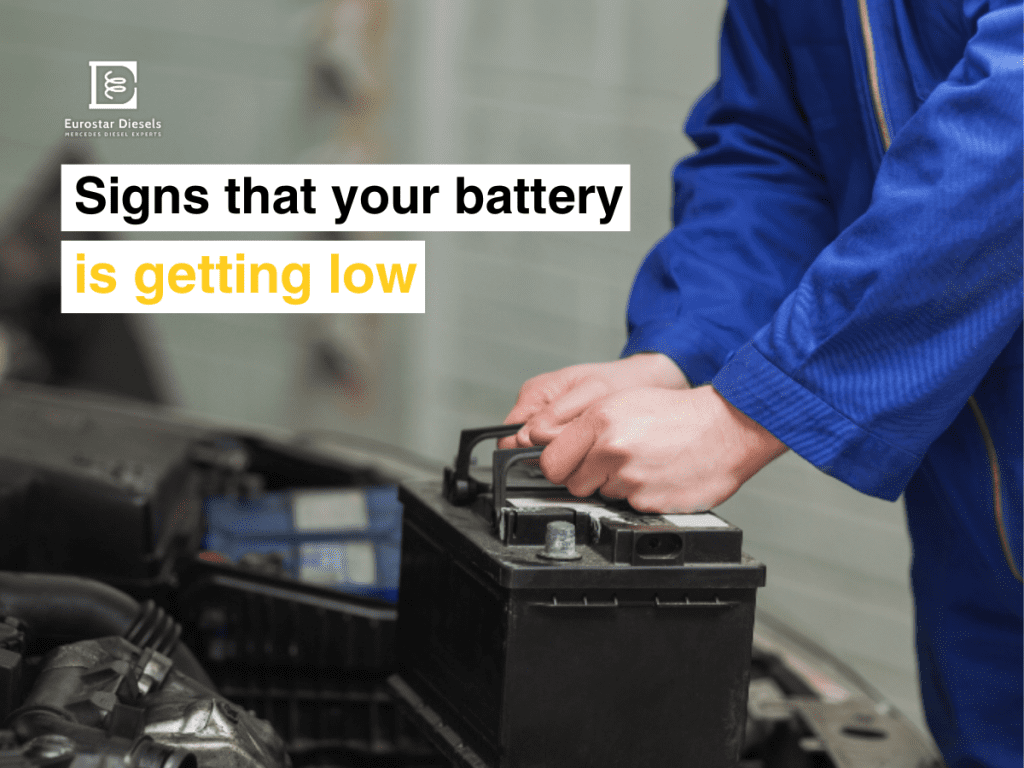The car’s battery is essential for powering everything from the engine to the electronics inside the vehicle. However, it doesn’t last forever, and knowing the signs of a dying battery can save you from unexpected breakdowns. Here’s a detailed guide to help you recognise when the battery in your Mercedes diesel vehicle is getting low.
Signs of a low battery:
Slow Engine Crank
One of the most common signs of a low battery is a slow engine crank. If you notice that your Mercedes diesel engine takes longer to start than usual, it could be due to a weak battery. Diesel engines require a significant amount of power to start, and a low battery will struggle to provide the necessary energy, resulting in a sluggish start. This is especially noticeable in diesel engines because they rely on high compression to ignite the fuel, which requires a robust and fully charged battery.
Dim Lights and Electrical Issues
Your car’s battery powers all the electrical components, including the headlights, dashboard lights, and radio. If you notice that your headlights are dimmer than usual or that your dashboard lights are flickering, it’s a clear sign that your battery may be running low. Electrical issues, such as the radio not working or power windows operating slower than usual, also indicate a potential battery problem. In modern Mercedes vehicles, advanced electrical systems and numerous electronic features depend heavily on a stable power supply from the battery. Therefore, any fluctuation in the battery’s performance can manifest as electrical issues.
Dashboard Warning Light
Most modern Mercedes vehicles are equipped with a dashboard warning light that indicates battery issues. This light is usually shaped like a battery or labeled “ALT” (alternator) or “GEN” (generator). If this light comes on while you’re driving, it’s a warning that your battery or alternator isn’t functioning correctly, and you should have it checked immediately. Ignoring this warning can lead to more significant issues, as the alternator recharges the battery while the engine is running, and a failing alternator can quickly drain a weak battery.

Swollen Battery Case
A swollen or bloated battery case is a physical sign that your battery is in trouble. This can happen due to extreme temperatures or overcharging, causing the battery to swell. If you notice that the battery case is swollen, it’s a sign that the battery needs to be replaced as soon as possible to avoid potential leaks or bursts. Overcharging can occur from a malfunctioning voltage regulator in the alternator, which is something to be cautious about in your Mercedes diesel vehicle.
Corroded Battery Terminals
Corrosion on the battery terminals is another sign of a dying battery. Over time, the terminals can accumulate a white, ashy substance, which can interfere with the battery’s ability to conduct electricity. If you notice corrosion, it’s a good idea to clean the terminals and check the battery’s charge level. In Mercedes vehicles, maintaining clean terminals is crucial as the vehicle’s sophisticated electronics require a strong and stable connection.
Frequent Jump Starts
If you find yourself needing to jump-start your Mercedes diesel vehicle frequently, it’s a clear indication that your battery is losing its ability to hold a charge. While jump-starting can temporarily solve the problem, it’s not a long-term solution, and you should consider replacing the battery. Frequent jump starts can also place additional strain on the starter motor and alternator, potentially leading to further costly repairs.

Unusual Odour
A leaking battery can emit a distinct rotten egg smell caused by sulfuric acid. If you detect this odor under the hood, it’s a sign that your battery is leaking and needs to be replaced immediately. Leaking batteries can cause damage to other engine components and pose a safety hazard. It’s essential to address this issue promptly to prevent acid damage to the engine bay and other critical parts of your Mercedes.
Old Age
Car batteries typically last between three to five years. If your Mercedes diesel vehicle’s battery is approaching or has surpassed this age range, it’s more likely to start showing signs of weakness. Even if you haven’t noticed any issues yet, it’s wise to have your battery tested regularly and consider replacing it pre-emptively. Regular testing can help you monitor the battery’s health and replace it before it fails completely.
Difficulty Starting in Cold Weather
Cold weather can be particularly tough on car batteries. If you notice that your Mercedes diesel vehicle has difficulty starting on cold mornings, it could be due to a weak battery. Cold temperatures reduce the battery’s ability to produce a sufficient charge, making it harder for the engine to start. Mercedes diesel engines, in particular, are more susceptible to cold weather issues, as they rely on battery-powered glow plugs to start efficiently.
Clicking Sound When Turning the Key
A clicking sound when you turn the key in the ignition is another sign of a low battery. This happens when the battery doesn’t have enough power to engage the starter motor fully. If you hear this clicking sound, it’s a clear indication that your battery is struggling to provide the necessary power. In a Mercedes diesel vehicle, the starter motor needs a significant amount of power to crank the engine, and a weak battery will often result in just a clicking noise without the engine turning over.
In conclusion…
Being aware of these signs can help you identify when your Mercedes diesel vehicle’s battery is getting low and take action before it fails completely. Regular maintenance and testing of your battery can prevent unexpected breakdowns and extend its lifespan. If you notice any of these signs, it’s best to have your battery checked by an experienced technician at Eurostar Diesels and replace it if necessary to keep your vehicle running smoothly. Ensuring your battery is in good condition is essential for the overall performance and reliability of your Mercedes diesel vehicle.

